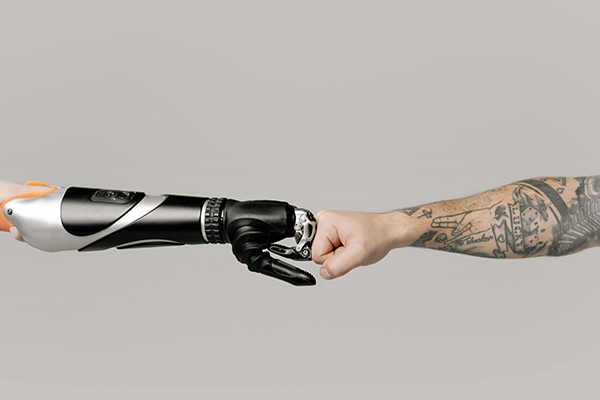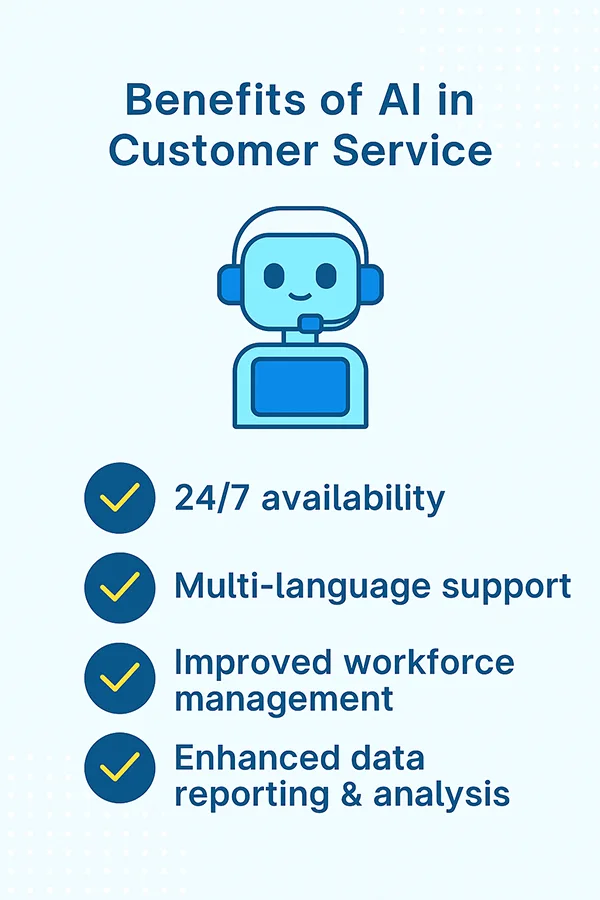AI can handle many requests nearly instantly, which reduces wait time and can offer faster, better, and more reliable customer support independently.
KEY TAKEAWAYS
- AI boosts efficiency by automating simple customer support tasks quickly.
- Chatbots provide 24/7 service with friendly and emotional recognition features.
- AI personalizes support using past customer data and interaction history.
- Automated follow-ups help businesses collect valuable customer feedback easily.

Gartner has reported in 2020 that by 2022, 70% of customer interactions (up from 15% in 2018) will involve emerging technologies, including tools for machine learning applications, chatbots, and mobile messaging. And now they have predicted that by 2027, nearly one in four organizations will use chatbots as their primary channel for customer service.
AI has gone far beyond basic automation; it has matured into a major catalyst for improving efficiency, reducing response times, and personalizing experiences for customers. Businesses utilize AI in nearly every capacity, from virtual agents to predictive analytics, to redefine how customers engage with companies.
This paper explores how AI is being used in customer support, the key benefits of AI, and its various implementations that will help create the structure of service delivery in the future.
Artificial Intelligence in customer service is a technology that helps businesses enhance their interactions with customers by answering various questions, explaining the basics, and even performing tasks on behalf of customers, such as booking a reservation or placing an order. By handling routine and repetitive tasks, AI frees up human employees to concentrate on more strategic and high-value responsibilities that drive business growth.
AI in customer service is typically available 24/7, allowing it to respond to customers’ requests and address their concerns without requiring human intervention. Some of the best conversational AI platforms this year have proved that AI has been taken to a whole new level. With the growing use of AI chatbots, these tools have become more conversational, emotionally aware, and user-friendly, making them highly effective across various industries.
The benefits of AI for many businesses are numerous. Customers get faster responses, consistent support, personalized interactions, scalability, better insights, etc. AI in customer service helps minimize mistakes and lowers operational costs by efficiently managing complex tasks that would typically need extra human support.
AI can handle FAQs, provide automated updates, or help customers navigate a website, which means that companies won’t need to hire additional employees for these functions, which greatly contributes to saving the company’s budget. Below, you can see some additional benefits.


AI is known for having the ability to analyze a large amount of data. Based on the type of business where the AI in customer service is being used, AI can access and analyze data such as browsing history, past purchases, canceled orders, reservations, and previous customer support interactions.
Based on all of this previously mentioned information that will be given within seconds, AI can create personalized recommendations and solutions, which is a kind of function that will surely improve customer service for any kind of business. With AI in customer service, customers feel recognized and valued, leading to greater satisfaction and a stronger, more positive brand reputation.
Imagine that you have a problem with some kind of service. Once the issue is resolved, the company follows up with a message to ensure you’re happy with the service provided.
You will probably feel like someone worthy, appreciated, and important. AI in customer service has exactly this ability. Once they solve the issue with a customer, they send an automated follow-up in order to gather feedback information. This thoughtful gesture enhances the overall customer experience and leaves a lasting positive impression on many individuals.
AI in customer service can be used in different ways. One of the most common AI types is chatbots that can answer various questions within just a few seconds. Over time, chatbots adapt by learning from past interactions, which helps them refine their responses and deliver more effective customer support. Other common types of AI that are being used are virtual assistants, self-service portals, predictive customer support, sentiment analysis, etc.
Some AI types can recognize the problem and direct the call to the right person or sector. They then recommend the right answers to the agents based on customers’ requests. This approach, similar to many alternatives, helps individuals avoid lengthy and tedious work, easing their burden and significantly simplifying the process.
Even though AI has numerous advantages for any kind of business, there are negative sides that everyone needs to pay attention to. At times, AI finds it difficult to grasp complicated queries, and some customers remain skeptical about relying on it. Compared to humans, AI cannot change the tone of its voice and show empathy, as it completely relies on programmed patterns and scripts.
AI is designed not to take the place of humans, but to assist them in enhancing their everyday activities and overall quality of life. AI in customer service solves repetitive and easy tasks, allowing other employees to focus on tasks that are more important for improving their company and their careers.
AI can handle many requests nearly instantly, which reduces wait time and can offer faster, better, and more reliable customer support independently.
AI can provide personalized experiences by assessing customer data based on purchases or history, and can suggest recommendations that enhance satisfaction and loyalty.
AI may struggle with complicated situations, demonstrate a lack of empathy, and find it hard to stray from pre-determined scripts, whereas human agents can demonstrate these qualities much more easily.
